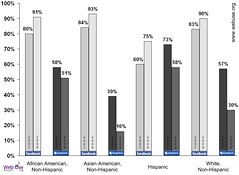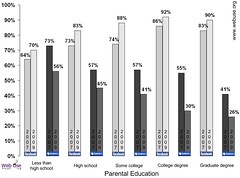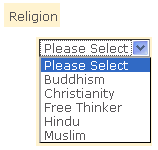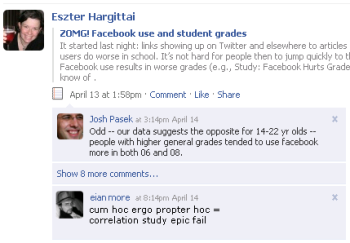links for 2010-02-28
February 28th, 2010-
comparing Google Suggest results
I had to watch the video below to solve a puzzle for a game. The timing was rather appropriate so I thought I’d repost it here. The part about what happens to Santa is a bit harsh and may be inappropriate for children under a certain age (oh, I don’t know, 102?).
 My edited methods book Research Confidential is out! I had asked for feedback about the title and cover illustration on Crooked Timber and here at Eszter’s Blog and accordingly have acknowledged the readers of both blogs in the Preface (see snapshot below) including an explicit shout-out to CT reader Vivian for inspiring the subtitle of the book: Solutions to Problems Most Social Scientists Pretend They Never Have.
My edited methods book Research Confidential is out! I had asked for feedback about the title and cover illustration on Crooked Timber and here at Eszter’s Blog and accordingly have acknowledged the readers of both blogs in the Preface (see snapshot below) including an explicit shout-out to CT reader Vivian for inspiring the subtitle of the book: Solutions to Problems Most Social Scientists Pretend They Never Have.
Today’s Inside Higher Ed has a Q&A with me about some questions related to the book such as why I opted for asking relatively junior scholars for contributions rather than going with more experienced senior researchers. Recently, the Chronicle also featured a Q&A with me about the chapter I co-authored with Chris Karr describing diary-data collection using text-messages.
Many thanks to the contributors of the volume for agreeing to respond to my somewhat unorthodox request to write about the behind-the-scenes dirty details of their research projects. If you’d like to read these, various online stores (e.g., Amazon, B&N, Michigan Press) are selling the volume.


My paternal grandmother, who was born in 1908 and died in 1988, used to have this collection of three postcards (?) up on her wall. I recently saw it at my parents’ place and requested that I take it with me so I could put it up in my home. It reminds me of my grandmother whom I loved dearly (and whom, as you can probably tell from the above dates, I knew for all too brief a part of my life). On the back, my grandmother wrote: Graz 1926-27. There is also some hard-to-read handwriting on the front that you can see on the image. Only recently did I stop to look at the pictures individually. For me, their entire meaning comes from my memories associated with them as a whole.
This excellent piece by Jonathan Zittrain explains very nicely the potential downsides of how cloud computing is developing these days. (“Cloud” here refers to having all our data reside out there on others’ machines instead of on our own devices.)
A few quotes, but as we like to say, read the whole thing.
The crucial legacy of the personal computer is that anyone can write code for it and give or sell that code to you — and the vendors of the PC and its operating system have no more to say about it than your phone company does about which answering machine you decide to buy. Microsoft might want you to run Word and Internet Explorer, but those had better be good products or you’ll switch with a few mouse clicks to OpenOffice or Firefox.
[..]
The iPhone’s outside apps act much more as if they’re in the cloud than on your phone: Apple can decide who gets to write code for your phone and which of those offerings will be allowed to run. The company has used this power in ways that Bill Gates never dreamed of when he was the king of Windows: Apple is reported to have censored e-book apps that contain controversial content, eliminated games with political overtones, and blocked uses for the phone that compete with the company’s products.
[..]
When we vest our activities and identities in one place in the cloud, it takes a lot of dissatisfaction for us to move. And many software developers who once would have been writing whatever they wanted for PCs are simply developing less adventurous, less subversive, less game-changing code under the watchful eyes of Facebook and Apple.
On a related note, this post seems like an appropriate occasion to link to this great cartoon, which the artist created over 10 months ago.
Two years ago, as part of a collection of articles researching social network site uses, I published a piece (blog post here) about the different predictors of Facebook and MySpace use among a diverse group of first-year college students. Some of the reactions to that paper suggested that the the differences by race/ethnicity and socioeconomic status identified in the data were only temporary and would soon change.
 I now have some new data to consider possible changes over the past two years. I haven’t written this up in any formal way yet (nor do I have more elaborate statistical analyses to share right now), but I do have some figures suggesting that the differences I identified two years ago persist today.
I now have some new data to consider possible changes over the past two years. I haven’t written this up in any formal way yet (nor do I have more elaborate statistical analyses to share right now), but I do have some figures suggesting that the differences I identified two years ago persist today.
Note that this is a new cohort of first-year students (i.e., not the same students resurveyed two years later) at the same universitywhere I conducted the study in 2007. (See details about the data collection and sample descriptives at the end of this post.)
 There are two main findings here. (Click on the images for larger versions or see the table below.) First, there is a general increase in use of Facebook and a general decline in use of MySpace across the board. In 2007, 79% of the study participants were using Facebook while in 2009, 87% of the sample reports doing so. In contrast, while in 2007, 55% of the group reported using MySpace, in 2009, only 36% do so.
There are two main findings here. (Click on the images for larger versions or see the table below.) First, there is a general increase in use of Facebook and a general decline in use of MySpace across the board. In 2007, 79% of the study participants were using Facebook while in 2009, 87% of the sample reports doing so. In contrast, while in 2007, 55% of the group reported using MySpace, in 2009, only 36% do so.
Second, we continue to see ethnic and racial differences as well as different usage by parental education (a proxy for socioeconomic status). Students of Hispanic origin are more likely to use MySpace than others and less likely to use Facebook than others. Asian American students are the least likely to be on MySpace. Regarding parental education, the relatively small number (7%) of students in the sample whose parents have less than a high school education are much more likely to be on MySpace and much less likely to be on Facebook than others. Students from families where at least one parent has a college degree are much less likely to be MySpace users than others.
In my 2007 paper, I talked a bit about what may be going on here, but getting deep into that is difficult through data of this sort. danah boyd does much more in-depth work in this realm – granted, on high school students not college students – and has shared reflections both two years ago and just last week on what may be going on.
I welcome suggestions on how to represent this information better (from the table below) on figures as I’m not too happy with my current attempts.

Descriptive statistics about the two samples are below. In both years, we collected data among students enrolled in the one required course at the University of Illinois, Chicago: the First-Year Writing Program. We administered a paper-pencil survey so as not to bias against those who spend less time online or those who are less comfortable with filling out surveys on the Web. The response rate in 2007 was 82%, in 2009 it was 80.5%. The sample here includes first-year students ages 18-24 who took the survey.

Many thanks go to the fabulous research assistants in the Web Use Project group who were instrumental in the collection of all these data.
The assumption about universal Internet access among Americans likely left some of the most enthusiastic Michael Jackson fans without the opportunity to enter the lottery for tickets to the memorial services being held today in Los Angeles. Registering for the lottery could only be done online and many millions of Americans don’t have Internet access in their homes. Worse yet, because registration was confined to the dates of July 3rd and July 4th, most public access points would have been inaccessible due to holiday closings at public libraries and other locations. Adding insult to injury, these constraints of online access are very much unequally distributed among the population leaving certain types of people – for example, African Americans – much less likely to have had the opportunity to enter the drawing.
Talking about the digital divide – or the differences between the technological haves and have-nots – is passé conjuring up seemingly outdated debates of the 1990s. Nonetheless, the fact remains that a big portion of Americans continues to live without Internet access at home or often without any Internet use anywhere. According to the
latest figures (2007) from the Census Bureau’s Current Population Survey, over 38% of American households report no home Internet use. Broken down by race and ethnicity, close to 55% of African American households and over 56% of Hispanic households do not report home Internet usage. The Pew Internet & American Life Project has more
recent figures confirming that large numbers of Americans continue to be disconnected with Blacks and Hispanics less likely to be online than Whites and Asian Americans.
Having the chance to win a ticket to the Michael Jackson memorial services required Internet access at several levels. First, one had to access a Web site on July 3rd or July 4th to sign up for the drawing. Second, entering the lottery required an email address. Third, in order to find out about winning, one would have to check email on Sunday, July 5th to see about winner notification.
So how come we’ve seen no buzz over this topic? Buzz these days seems to come from online discussions and by definition, the people being excluded in this process are not online. They don’t run searches on Google, they don’t use Twitter, they don’t blog and consequently what’s on their minds does not show up in data about trending topics online. This is just one example of how the voices of those not online and the positions they represent are systematically excluded from conversation and public discussions. Millions of Americans are not online and this is just one example of the many opportunities from which they are systematically excluded on a daily basis due to this constraint.
Of course, there is no basic right associated with a chance to attend the Michael Jackson memorial services, but the rhetoric suggesting that anyone could enter the contest is problematic and perpetuates assumptions about how universal Internet use is in this country.
Since delicious has decided not to play nice with my blog again (that is, post automatic updates), here it goes manually.
Reading Twitter in Tehran (Washington Post) op-ed piece by Berkmanites John Palfrey, Bruce Etling and Rob Faris “Why Twitter Won’t Bring Revolution to Iran”
Postlets “real estate marketing for Web 2.0”
Iowa teen is the latest texting champion (MSNBC)
Pixar grants girl’s dying wish with home viewing of ‘Up’ (OCRegister) – “Company sent DVD so Huntington Beach girl, 10, could watch it”
Internet and Broadband Adoption over time Pew graphic
Academic Earth “video lectures from the world’s top scholars”
How to lose your job in 140 characters or less (The Brand Builder blog)
Unemployed workers are finding more jobs through social networking sites (CNN Money)
U.S. State Department Speaks to Twitter over Iran (Reuters)
An interrupting culture – The Economist’s and its readers take on my post about seminar cultures
I don’t always get xkcd although often enough I think it’s quite funny and on occasion I think it’s just brilliant. Here’s one I’m surprised my students haven’t put on a T-shirt for me yet. And you might recall our CT discussion of this one. Today, Randall Munroe has added another to my collection of favorites, check it out. (I even forgive him for a slight misspelling at the end. I won’t get into specifics, because it would be a spoiler. See the first comment below for more. UPDATE an hour later: the typo has been fixed.)
I had posted the following on Crooked Timber last week, but forgot to cross-post it here so it’s a bit late.
Between the topic of Michèle Lamont’s posts, the discussion that followed John Holbo’s note on manners and now John Quiggin’s query about seminar questions, it’s a good opportunity to describe an incident I experienced years ago. I was surprised economists didn’t get more of a mention in the thread following John H’s post earlier given what I’ve seen in their colloquia. I have close-to no experiences in philosophy exchanges (and yet I dare call myself a Timberite…), but I’ve attended quite a few talks among economists so I’m used to their style of Q&A. As some have noted, it often starts a few slides in – or in some famous cases the speaker doesn’t get to proceed past the title slide for most of the time allotted – and being rather aggressive seems standard. If that’s the local norm, they are likely used to it and it doesn’t raise any eyebrows. However, what if you put such an economist in a room full of sociologists? Is it okay for him to import his style or should he take a moment to familiarize himself with the local norms?
What struck me as rather curious was the way an economist behaved during a job talk I attended in a sociology department a few years ago. The economist engaged in the usual norms for his own department’s culture: interrupting at pretty much every slide. He didn’t take any cues from the rest of the group as to how people behave in the community he was visiting. That is, sociologists don’t tend to interrupt a speaker, certainly not a slide or two in, and certainly not for questions that are more than mere points of clarification. Add to that the fact that this was a job talk, which in some places may elicit even more aggressive behavior, but in the culture of this particular department meant that people would be at least as, if not more, courteous as usual. (Do not confuse courteous with lack of very serious and difficult questions, of course.) The audience was listening intently and the room was quiet for the most part except for the economist’s questions and the sighs of frustrations that started to emerge as the visitor continued to interrupt the speaker.
It’s fine if one doesn’t know the culture of another discipline. However, in such a situation, one might want to be a bit conscious of one’s environment and try to pick up some signals about how others are behaving. Did this economist think that he was the only one smart or engaged enough to have questions? After the third or fourth interruption, all of which came from him, it is a bit surprising that he did not pick up on the fact that his approach was not in line with local norms. Perhaps he did, but just didn’t care.
I was clearly not the only one bothered by the economist’s style. The uneasiness in the room was palpable. In the end, a senior sociologist stepped in. She turned to the economist and explicitly stated that this is simply not how we do things and asked that he hold his questions until the speaker had finished his talk. You could tell that everyone (presumably other than the economist) in the room was quite relieved to have had her do this.
At IHE, Scott Jaschik has a piece about a site that sells corrupted files to students as a way to get a few extra hours or days to finish an assignment. The idea is that the student submits a corrupted file, it takes the instructor a while to figure this out, in the meantime the student finishes the assignment.
Although I’ve never had students send me corrupted files, I’ve certainly had them supposedly send me attachments that weren’t there in reality. Of course, most people have, at one time or another, forgotten to attach a file to an email so it’s hard to assume it’s always intentional, but one wonders.
The piece made me reflect on what other excuses are emerging in the new digital environment that weren’t in vogue earlier. I’ve had students claim to have lost their Internet connection at home making it difficult to meet a deadline. While on the one hand, I tend to be skeptical of this, ISPs are sufficiently bad that it’s not completely implausible. What’s your favorite digital-era bogus excuse?
As a tribute to old excuses that presumably some still use, here’s a link to the “The Dead Grandmother/Exam Syndrome and the Potential Downfall Of American Society” [or pdf] by Mike Adams in case there are people who haven’t seen it yet.
I’m starting a new research project (if I manage to get some funding) related to job searching. I was talking about it with my friend danah and she sent me a link to the McDonald’s online job application site for Singapore. (That latter bit is not obvious from the site at all, but it seems to be the one for Singapore.)
 I looked at the first page an applicant has to fill out and found a question about religion with the options to the right on the screen shot. To be sure, this is not signaled as required information, nonetheless, I found it curious. For one thing, why is there no “Other” option? Anyone know anything about why such a job application would have this field in Singapore? Could this have to do with handling certain types of food? And somewhat unrelated (presumably), any thoughts on why McDonald’s doesn’t make it more clear on the site and form that this is the Singapore-specific job application form?
I looked at the first page an applicant has to fill out and found a question about religion with the options to the right on the screen shot. To be sure, this is not signaled as required information, nonetheless, I found it curious. For one thing, why is there no “Other” option? Anyone know anything about why such a job application would have this field in Singapore? Could this have to do with handling certain types of food? And somewhat unrelated (presumably), any thoughts on why McDonald’s doesn’t make it more clear on the site and form that this is the Singapore-specific job application form?
I’ve uploaded a copy of the full screen here in case you’d like to see the question in context and don’t want to click through to it.
I’ll be in Paris later this month and am looking for the following type of hotel. I’d like it to be in/near the 16th or 5th, 6th or 7th. (Yes, I know, those are rather different neighborhoods. I once lived in the 16th and am somewhat nostalgic even though it wouldn’t be most people’s first touristy choice.) I’m not looking for anything either super fancy or run-down, it doesn’t have to be charming or cute, not that those latter qualities would be a problem.:) I don’t care about the size of the rooms, but I do care about cleanliness. It doesn’t have to be the cheapest place, but it shouldn’t be too expensive either (up to, say, about $200/night). I realize a lot of these parameters are relative, if you could say why you’re recommending a place, that would be great. Ideally, it would be a few blocks from a metro station. Free wifi would be splendid or a cafe nearby that has it would be great as well. Any suggestions? Thanks!
 Following up on my blog post from a few weeks ago, a couple of colleagues and I have published a formal response to the media frenzy covering the study that claimed a relationship between Facebook use and lower grades.
Following up on my blog post from a few weeks ago, a couple of colleagues and I have published a formal response to the media frenzy covering the study that claimed a relationship between Facebook use and lower grades.
Back when the story broke, most media outlets ran with the claims made in the original press release or even took it to a next step by suggesting a causal relationship between Facebook use and lower grades. Only a few outlets took care in reporting, among them the Chronicle of Higher Education. In the last few days, the BBC has had a piece considering the various perspectives.
By the way, this is the quickest turn-around I’ve ever experienced with an academic publication. Below the fold is a bit more describing how it came about. Read the rest of this entry »